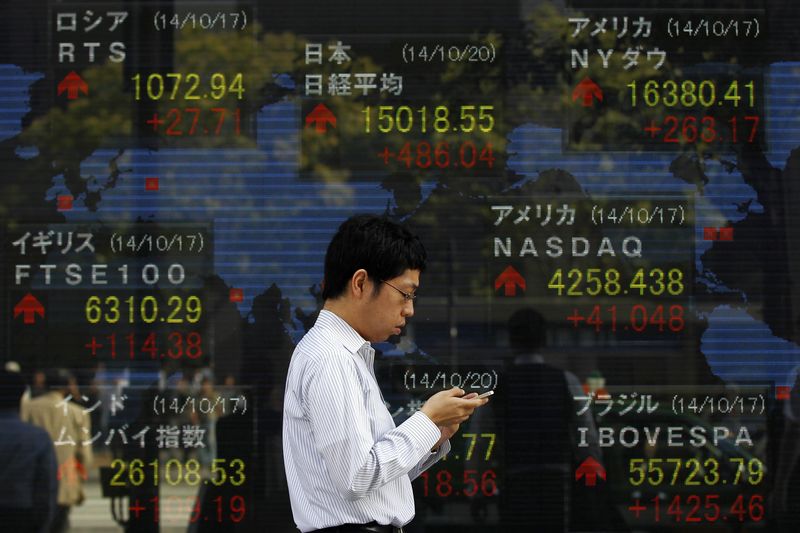Goldman Sachs expects Nvidia ’beat and raise,’ lifts price target to $240
Investing.com-- Asian stock markets were mixed on Friday, with Japan and South Korea extending record rallies on tech sector gains, while Chinese shares fell after weak factory activity data underscored ongoing economic headwinds.
Market participants also assessed Tokyo’s consumer inflation and factory output readings, a day after the Bank of Japan held rates steady.
Major Wall Street indices fell sharply overnight amid concerns about artificial intelligence spending, while futures tied to them surged in early Asian hours, boosted by strong quarterly results from Apple Inc (NASDAQ:AAPL) and Amazon.com (NASDAQ:AMZN).
Nikkei, KOSPI set for monthly surge
Japan’s Nikkei 225 jumped as much as 2.1% to hit a fresh record high of 52,391.45 points, while the broader TOPIX index gained 0.4%.
Gains were buoyed by semiconductor and AI-related shares, tracking futures tied to U.S. tech stocks. The benchmark index was set to jump more than 15% this month.
In Seoul, the KOSPI added 0.7%, trading just below record highs touched in the previous session, powered by heavyweight chipmakers such as Samsung Electronics (KS:005930) and SK Hynix (KS:000660).
KOSPI was on track to jump 20% in October.
Elsewhere, Australia’s S&P/ASX 200 edged 0.3% higher, while Singapore’s Straits Times Index dipped 0.2%.
Futures for India’s Nifty 50 edged down before market open.
China PMI disappoints; Tokyo CPI accelerates
Official data on Friday showed Chinese manufacturing activity contracted for a seventh consecutive month, while the services purchasing managers’ index (PMI) edged up only slightly.
The data reinforced concerns over China’s sluggish recovery and fueled speculation that Beijing may soon announce additional support measures.
China’s blue chip Shanghai Shenzhen CSI 300 dropped 1%, while the Shanghai Composite declined 0.7%. Hong Kong’s Hang Seng index fell 0.6%.
Investor sentiment was also shaped by lingering caution following Thursday’s meeting between U.S. President Donald Trump and Chinese President Xi Jinping.
U.S. President Donald Trump described their talks as “amazing,” and both parties discussed trade tariffs and technology exports, but offered few concrete commitments, leaving markets hesitant to price in a clear breakthrough.
In Japan, a raft of fresh economic data added nuance to the Bank of Japan’s policy outlook.
Tokyo’s core consumer price index rose 2.8% in October from a year earlier, exceeding expectations and highlighting persistent inflationary pressures.
Factory output in September rose 2.2% from the previous month, beating forecasts, while retail sales climbed a modest 0.5% year-on-year, signaling fragile domestic demand.
The stronger-than-expected inflation data may keep the BOJ under pressure to tighten policy sooner than anticipated, though policymakers have stressed that wage growth must remain robust to justify further rate hikes.
